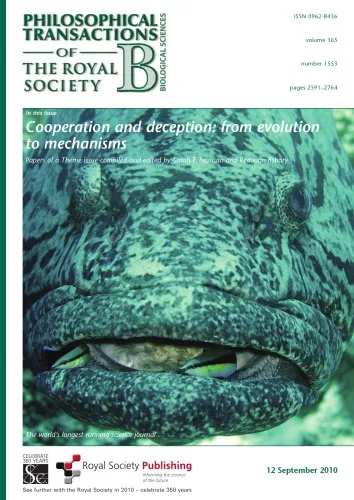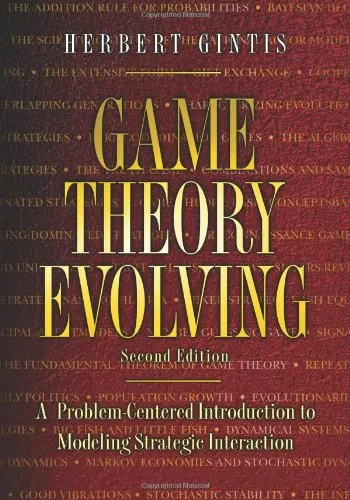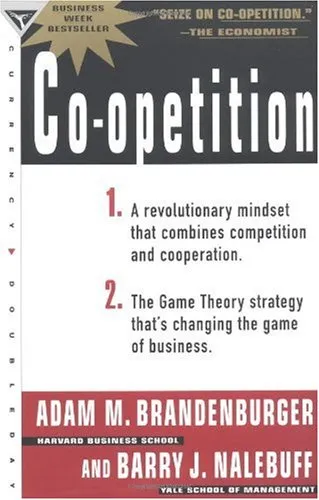Cooperation and Deception: From Evolution to Mechanisms (Philosophical Transactions of the Royal Society series B)
4.5
Reviews from our users

You Can Ask your questions from this book's AI after Login
Each download or ask from book AI costs 2 points. To earn more free points, please visit the Points Guide Page and complete some valuable actions.Related Refrences:
Introduction to "Cooperation and Deception: From Evolution to Mechanisms"
In the intricate tapestry of life, two behaviors stand out as defining features of species striving to survive and thrive – cooperation and deception. These behaviors, while seemingly contradictory, are deeply interconnected and crucial for understanding evolutionary biology, behavioral science, and even emerging fields such as artificial intelligence. In this academic yet accessible book, we dive deep into the intricate relationship between cooperation and deception, tracing their origins from evolutionary processes to the biological and psychological mechanisms that sustain them.
Edited by Sarah F. Brosnan and Redouan Bshary, this volume is part of the esteemed "Philosophical Transactions of the Royal Society series B" and comprises a multidisciplinary exploration of these phenomena. Recognizing that cooperation and deception often go hand in hand, the book combines insights from evolutionary biology, comparative psychology, philosophy, and neuroscience to unravel the nature of these behaviors. By weaving together theoretical frameworks, empirical studies, and philosophical reflections, the book seeks to answer critical questions such as: Are humans uniquely cooperative or deceptive? How do non-human animals balance the trade-offs between these two strategies? And most importantly, what can this tell us about the evolution of social systems and cultural interactions?
In what follows, we provide a detailed summary of the book, highlight key takeaways, and explore why this work matters in both academic circles and broader societal discourse.
Detailed Summary of the Book
"Cooperation and Deception: From Evolution to Mechanisms" brings together a collection of essays and research papers from leading experts across various scientific disciplines. The book is structured to gradually build a comprehensive understanding of these phenomena, starting from their evolutionary roots.
In the early chapters, the contributors explore the evolutionary origins of cooperation. They delve into examples from both human and animal behavior, emphasizing the role of kin selection, reciprocal altruism, and group selection. The concept of the "selfish gene" plays a pivotal role in these discussions, challenging readers to rethink the balance of individual versus group benefits.
Midway through the book, attention shifts to deception, ranging from simple trickery seen in certain animals to complex human strategies such as lying and manipulation. The evolution of deception becomes a fascinating topic, with contributors presenting evidence of how it often co-evolves with cooperative behavior in symbiotic and competitive contexts.
The final sections focus on the mechanisms underlying cooperative and deceptive behaviors. This includes detailed studies of cognitive processes, neurobiological correlates, and cultural factors that influence these actions. By the end of the book, the editors bring these perspectives together to present a unified framework for understanding how these behaviors shape societies, from animal groups to human cultures.
Key Takeaways
- Cooperation is not unique to humans; it is widespread across the animal kingdom and often underpinned by evolutionary mechanisms like reciprocal altruism or kin selection.
- Deception and cooperation frequently co-evolve, with deception often acting as a test or challenge that refines cooperative systems.
- Social cognition plays a critical role in both phenomena, requiring individuals to assess others' intentions, reputations, and likely actions.
- The balance between cooperation and deception holds profound implications for social structures, trust dynamics, and even innovation.
- Understanding these behaviors in non-human species provides valuable insights into the quirks and complexities of human social life.
Famous Quotes from the Book
“Cooperation is evolution’s answer to solitude; deception, its counterbalance.”
“Every act of kindness carries the shadow of its own exploitation – thus, we are wired to weigh the benefits and risks of trust.”
“While some animals build bonds through mutual aid, others thrive by exploiting those bonds – and often, the same species can do both.”
Why This Book Matters
This book is a critical resource for anyone interested in understanding the social glue that holds together organisms, groups, and societies. Cooperation and deception are not just behaviors – they are strategies that have shaped life on Earth in profound ways. By exploring these dual forces, the book sheds light on fundamental human questions, from why we trust and betray to how we build alliances and societies.
Beyond academia, this book is also relevant in fields such as artificial intelligence, where understanding cooperation and deception is crucial for programming ethical decision-making. It also informs discussions on societal challenges like climate change, political negotiations, and trust in the digital age.
Ultimately, "Cooperation and Deception: From Evolution to Mechanisms" is more than a scientific exploration – it is a call to understand the forces that define our interactions with one another, our communities, and our shared world.
Free Direct Download
You Can Download this book after Login
Accessing books through legal platforms and public libraries not only supports the rights of authors and publishers but also contributes to the sustainability of reading culture. Before downloading, please take a moment to consider these options.
Find this book on other platforms:
WorldCat helps you find books in libraries worldwide.
See ratings, reviews, and discussions on Goodreads.
Find and buy rare or used books on AbeBooks.
1294
بازدید4.5
امتیاز0
نظر98%
رضایتReviews:
4.5
Based on 0 users review
Questions & Answers
Ask questions about this book or help others by answering
No questions yet. Be the first to ask!













